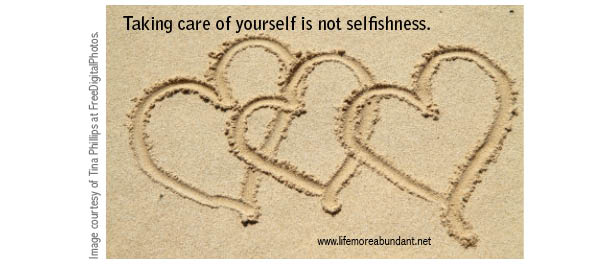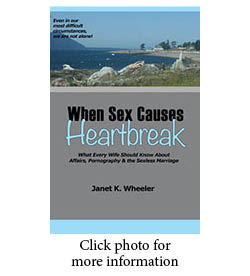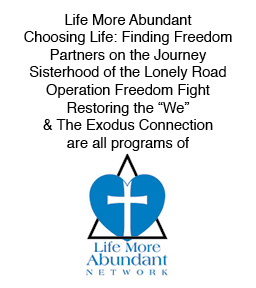It’s easy for wives and moms to feel overwhelmed and under-appreciated—especially during the holidays. This is even more true for women whose husbands have become habitually distant or distracted by addiction or recovery.
It’s easy to become bitter when the person who vowed to cherish us, doesn’t even notice that we could use a little help or emotional support. I remember having some of my own, not-so-proud, moments of muttering under my breath and banging things around the kitchen (just a little 🙂 ) as the others in the house cluelessly enjoyed a leisurely day off in front of the TV.
The good news is that, as your husband continues in recovery, he will, eventually, get to a place where he can actually see outside of himself and become more aware of the needs of those around him. In the meantime, you may have to face the fact that you may be the only one, at least this year, that is available to take care of you.
Perhaps some of you have heard of the time-tested recovery concept called H.A.L.T. This acronym provides a helpful way for addicts to remember to pay attention to avoiding four things that will make them vulnerable to old patterns. These same things can improve your ability to cope with the additional stressors of the holidays.
Hungry
- “Standard” holiday eating habits like skipping meals, binge eating or excessive sugar or carbohydrates can compromise our body’s normal chemical balance and create mood and energy swings that significantly impact both our emotional and physical stamina.
- Regular healthy meals help us maintain optimum functionality within our systems and keep our thoughts, emotions and behaviors under control, even when the situation is less than ideal.
- Focusing on providing your body with good nutrition, on a fairly consistent schedule, will help you feel better and maintain a more positive attitude.
Angry
- Even when our anger is justified, it can cloud our judgment and escalate small problems into crises. Unresolved anger grows quickly into dangerous resentment.
- Repressed resentments can turn inward and cause physical sickness, self-hatred or depression. Conversely, they can develop into a deep-rooted anger and bitterness that will find explosive release when and where it is least expected. Either outcome will further compound an already difficult situation.
- Try to ask directly for what you need, whether it be help, companionship, or something else. Addicts (including recovering ones) are seldom good at catching subtle clues or “just knowing,” even if you think they should. You don’t have to stoop to being whiny, naggy or coy. Just explain what you need.
Lonely
- Feelings of loneliness are similar to physical pain—they are a sign that something is wrong and needs attention. Pain is a gift from God to encourage us to reach out for the help we need.
- The emotional pain of loneliness is an indicator that we are becoming disconnected. God knows it isn’t good for us so he provided lonely feelings to remind us to reach out to Him and the safe people in our lives for support and encouragement.
- If your family is currently unable to provide this for you, even if asked directly, we encourage you to establish a couple of “lifelines” just in case you need them. Before the holidays, speak to a few of your closest confidantes about your struggles with loneliness during the holidays. Ask if they would be available to call if you find yourself struggling this year. Keep the phone call short—ideally just five or ten minutes. Use this as a time to genuinely connect with a friendly voice and not as an opportunity to vent.
Tired
- Late nights, excessive busyness and increased stress will leave us exhausted. During the holidays when we are trying to add shopping, cooking, entertaining, decorating and a hundred other seasonal tasks to an already full schedule we often ignore many of our physical and emotional needs.
- Pay special attention to scheduling sleep and relaxation. Take periodic breaks from your tasks. Make and sip a cup of tea. Seek out other stress reduction techniques.
- Allowing yourself to become physically or emotionally exhausted is a short-cut to a crash.
As we become increasingly aware of our true God-given needs for food, companionship, anger resolution and rejuvenation, we can begin to learn how to take appropriate actions to meet those needs in a healthy, God-honoring way, in spite of the current limitations of our loved ones.
“The prudent see danger and take refuge, but the simple keep going and pay the penalty.” — Proverbs 27:12
TODAY’S CHAT: Which of the H.A.L.T. issues affect you negatively most often—being hungry, angry, lonely or tired? What steps can you take to reduce its effect on you?



Leave A Response